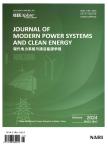Data-driven Reactive Power Optimization of Distribution Networks via Graph Attention Networks
作者机构:Wind Engineering and Renewable Energy LaboratoryEcole Polytechnique Federale de Lausanne(EPFL)Lausanne 1015Switzerland the College of Information and Electrical EngineeringChina Agricultural UniversityBeijing 100083China the College of Electrical Engineering and AutomationShandong University of Science and TechnologyQingdao 266590China the Department of Electrical and Electronic Engineering(Energy Digitalization Laboratory)The University of Hong KongHong KongChina the Department of Electrical EngineeringThe Hong Kong Polytechnic UniversityHong KongChina
出 版 物:《Journal of Modern Power Systems and Clean Energy》 (现代电力系统与清洁能源学报(英文))
年 卷 期:2024年第12卷第3期
页 面:874-885页
核心收录:
学科分类:080802[工学-电力系统及其自动化] 0808[工学-电气工程] 08[工学]
主 题:Reactive power optimization graph neural network distribution network machine learning data-driven
摘 要:Reactive power optimization of distribution networks is traditionally addressed by physical model based methods,which often lead to locally optimal solutions and require heavy online inference time *** improve the quality of the solution and reduce the inference time burden,this paper proposes a new graph attention networks based method to directly map the complex nonlinear relationship between graphs(topology and power loads)and reactive power scheduling schemes of distribution networks,from a data-driven *** graph attention network is tailored specifically to this problem and incorporates several innovative features such as a self-loop in the adjacency matrix,a customized loss function,and the use of max-pooling ***,a rulebased strategy is proposed to adjust infeasible solutions that violate *** results on multiple distribution networks demonstrate that the proposed method outperforms other machine learning based methods in terms of the solution quality and robustness to varying load ***,its online inference time is significantly faster than traditional physical model based methods,particularly for large-scale distribution networks.



